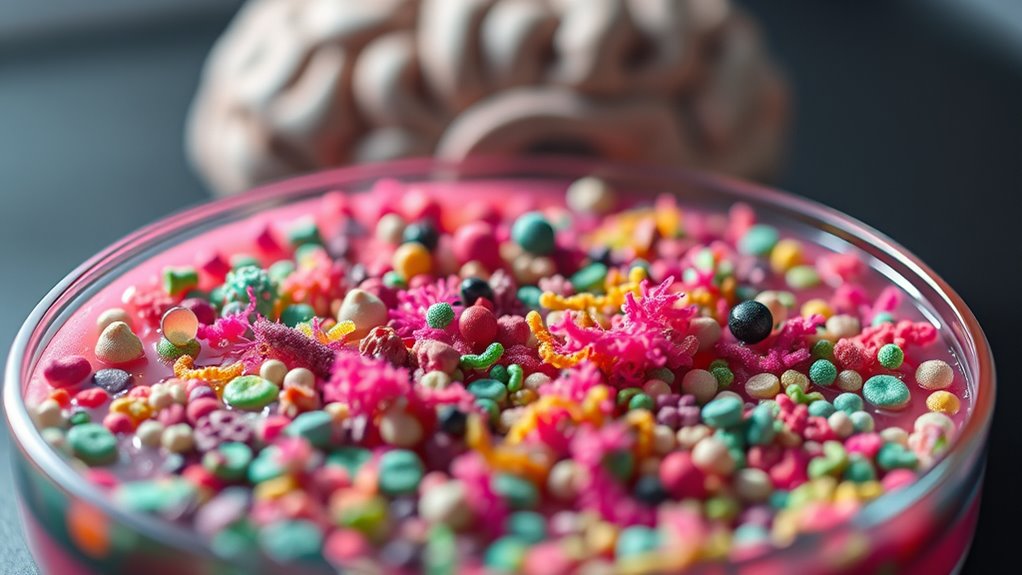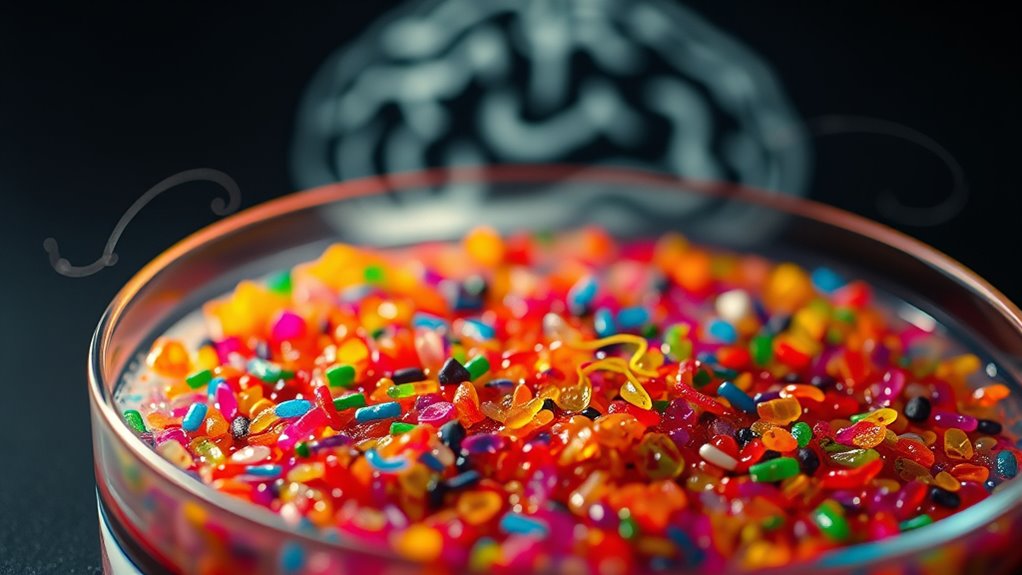The gut-brain connection highlights how your gut microbiota influence impulse control and emotional health. These microorganisms produce metabolites that directly affect neurotransmitter levels, impacting mood and decision-making. A diverse gut microbiome enhances communication with your brain, improving impulse management. Meanwhile, dietary choices that support microbiota diversity can lead to better mental well-being. Understanding this link can unleash strategies to elevate your emotional state and behavior. Discover how nurturing your microbiome can make a difference.
Key Takeaways
- Gut microbiota influence impulse control through their production of metabolites that affect neurotransmitter levels in the brain.
- A diverse microbiome enhances gut-brain communication, promoting better emotional regulation and decision-making.
- Diets rich in whole foods and fiber support microbiota diversity, improving impulse management and mental health.
- Imbalanced gut microbiota can lead to poor impulse control and increased cravings, affecting behavior regulation.
- Recognizing the gut-brain connection offers actionable strategies for enhancing mental well-being and impulse control through lifestyle choices.

As you explore the fascinating link between your gut and brain, you might be surprised to learn how closely intertwined these two systems really are. Recent breakthroughs in research have revealed that the microbiota within your gut plays a critical role in shaping your impulse control. These tiny organisms, which vary in diversity from person to person, have a considerable impact on your neural pathways, influencing everything from your mood to your decision-making capabilities.
When you think about impulse control, you might picture the brain as the sole player in this intricate game. However, it turns out the gut is just as essential. The microbiota diversity in your digestive system can determine how well your brain communicates with your body. A diverse microbiome can foster a healthy gut-brain axis, which is necessary for regulating emotions and behaviors. If your gut microbiota is imbalanced, it can lead to poor impulse control, making it difficult to manage cravings or resist temptations.
You might wonder how these microorganisms manage to influence your brain. The answer lies in the neural pathways that connect your gut to your brain. When you consume food, your gut microbiota interacts with the nutrients, producing metabolites that travel through your bloodstream. These metabolites can reach the brain, affecting neurotransmitter levels and altering your mood. For instance, certain strains of bacteria are known to produce serotonin, a neurotransmitter that substantially affects your emotional well-being.
Moreover, your diet plays a key role in maintaining microbiota diversity. If you’re consuming a variety of whole foods rich in fiber, you’re likely fostering a healthy microbiome. Conversely, a diet high in processed foods can diminish that diversity, impacting your impulse control adversely. By choosing foods that support a thriving gut microbiome, you can enhance your neural pathways and improve your overall mental health. Additionally, research indicates that a balanced microbiome can also influence grocery savings strategies, helping you make healthier food choices while saving money.
In essence, understanding the gut-brain connection offers you a powerful insight into how you can take control of your impulses. By nurturing your microbiota diversity through mindful eating and lifestyle choices, you can positively influence your brain function and emotional regulation. So, next time you think about impulse control, remember that your gut is not just a digestive powerhouse; it’s a key player in your mental landscape, influencing your decisions and behaviors in ways you may have never imagined.
Frequently Asked Questions
How Can I Improve My Gut Health for Better Impulse Control?
To improve your gut health for better impulse control, focus on increasing gut flora diversity. Incorporate a variety of fruits, vegetables, and fermented foods into your diet. These foods boost your digestive enzymes, helping your gut function more efficiently. Additionally, consider taking probiotics to enhance your gut microbiome. Stay hydrated and limit processed foods, as they can negatively impact gut health. By making these changes, you’ll likely notice better impulse control over time.
Are There Specific Foods That Enhance Gut-Brain Communication?
Fermented foods and dietary fibers fuel fantastic gut-brain communication! Incorporate yogurt, sauerkraut, and kimchi into your meals; these delicious delights are packed with probiotics that support gut health. Pair them with fiber-rich fruits, vegetables, and whole grains to feed your beneficial bacteria. Together, they create a thriving environment for communication between your gut and brain, enhancing overall well-being. So, get creative in the kitchen and enjoy the benefits of these gut-friendly foods!
Can Probiotics Influence My Mood and Decision-Making?
Yes, probiotics can influence your mood and decision-making by modulating the microbiota along the brain-gut axis. When you incorporate probiotics into your diet, they help balance your gut bacteria, which can lead to improved neurotransmitter production. This means you might experience better emotional regulation and clearer thinking. By nurturing your gut health, you’re not just supporting digestion; you’re enhancing your overall mental well-being and making more informed choices daily.
What Role Does Stress Play in Gut-Brain Interactions?
Stress plays a significant role in gut-brain interactions by influencing stress modulation and impacting microbiota resilience. When you experience stress, your gut can react negatively, altering the balance of beneficial bacteria. This imbalance may lead to mood swings and poor decision-making. By managing stress effectively, you can help maintain a healthier microbiome, promoting better emotional well-being and cognitive function. So, focusing on stress reduction can enhance your gut health and overall mental clarity.
How Does Gut Microbiota Affect Mental Health Disorders?
Think of your gut as a bustling city, where microbiota diversity plays a crucial role in maintaining mental health. When your gut microbiota thrives, it strengthens the gut-brain axis, enhancing mood and reducing anxiety. Conversely, a lack of diversity can lead to imbalances, increasing the risk of mental health disorders. By nurturing your gut with a variety of foods, you can positively influence your mental well-being and overall emotional resilience.
Conclusion
In understanding the gut-brain connection, you realize that your microbiota influences not just your digestion but your impulse control too. By embracing this knowledge, you empower yourself to improve your mental well-being, enhance your decision-making, and foster healthier habits. As you nurture your gut, you cultivate a clearer mind, a more balanced life, and a stronger sense of self. The journey to better health starts within, reminding you that every bite can shape your brain’s destiny.










